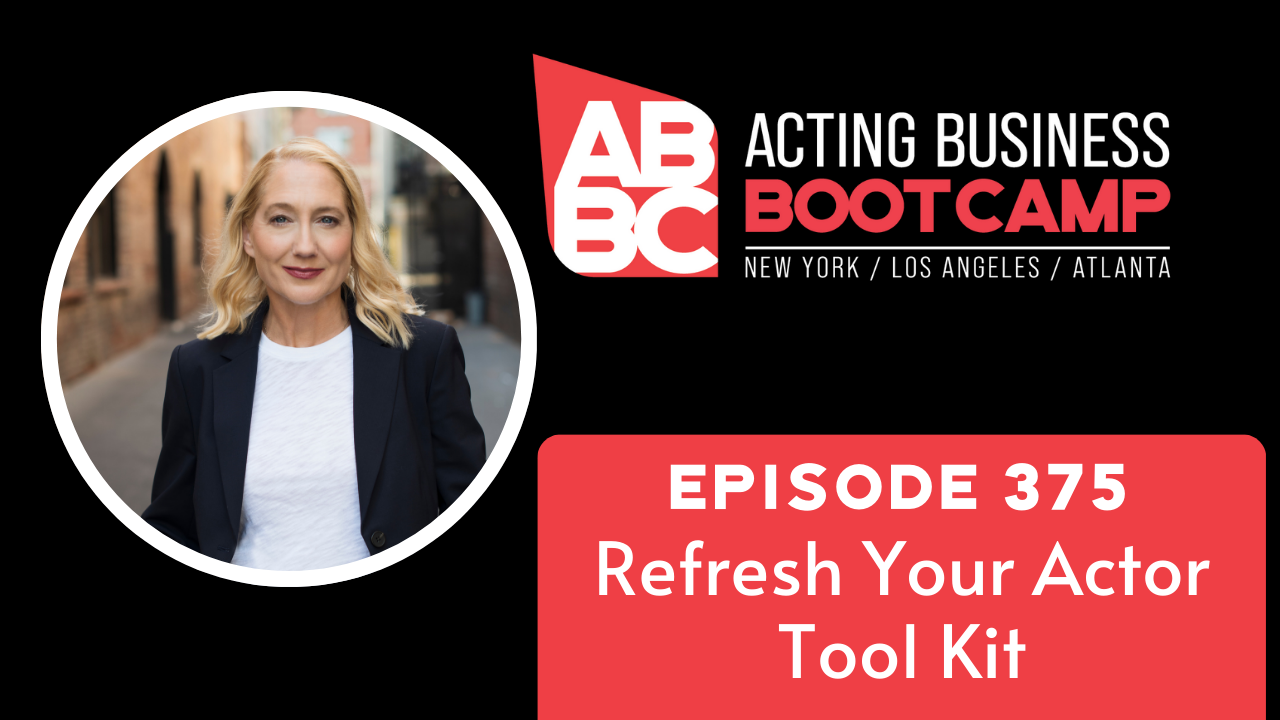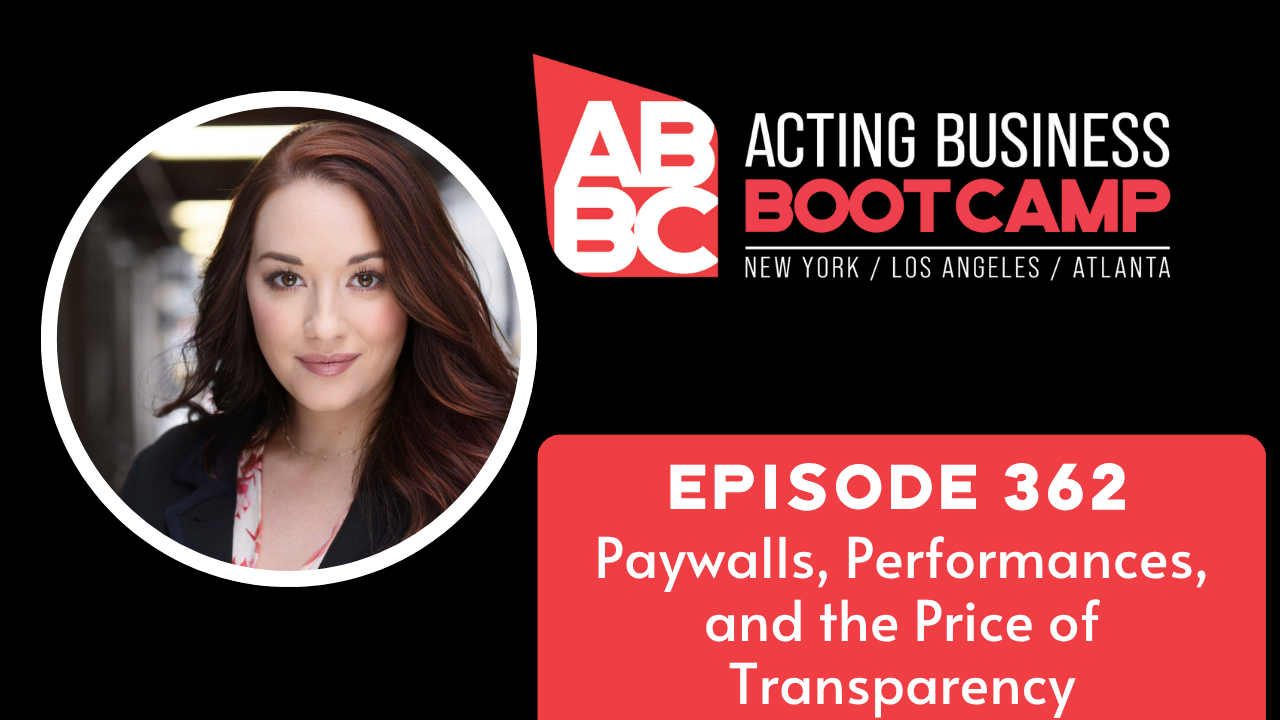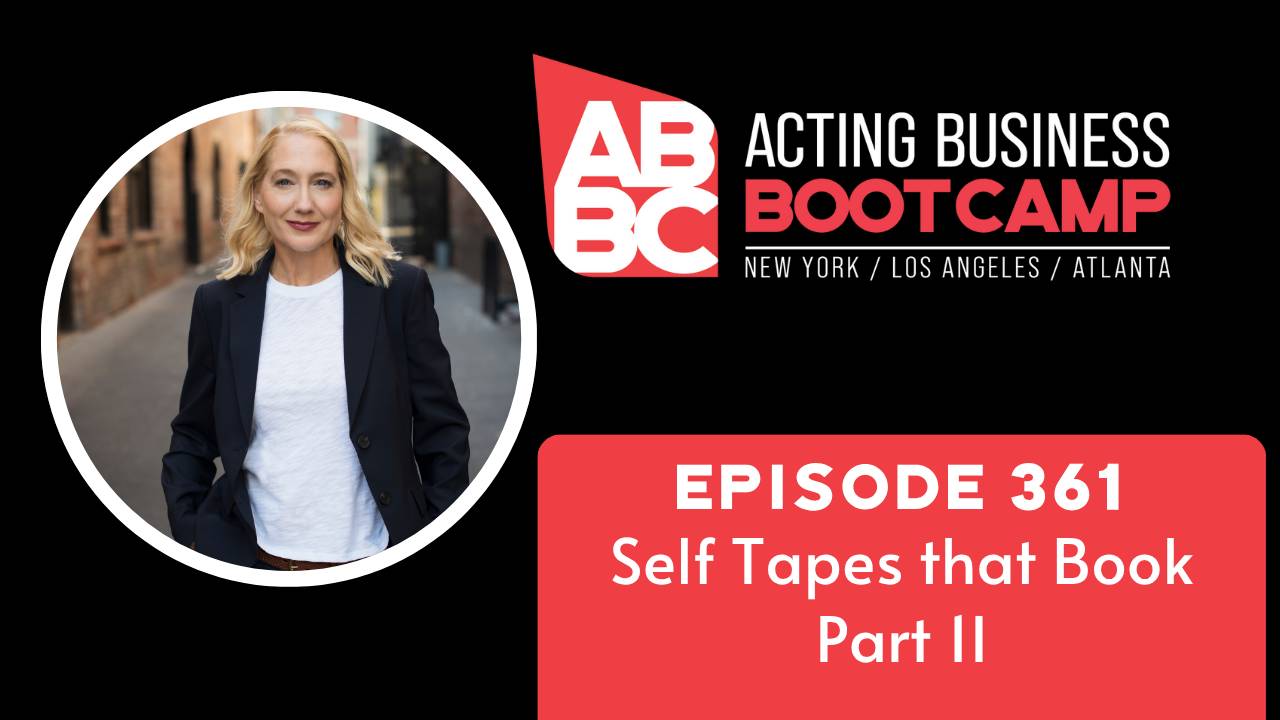The Acting Business Boot Camp Podcast
Episode 375: Refresh Your Actor Tool Kit

Things are heating up in the Weekly Accountability Time Management Class, and this episode is all about one of the most important topics for any working actor: how to refresh your toolkit for 2026.
I have five essential points to cover that will help you align your tools with the actor you are becoming. Let's get started.
Align Your Tools with the Actor You Are Becoming
Every piece of your toolkit should answer one question: What are the roles that I am calling in with my tools?
Your headshots, your reels, your clips, your website, your resume—they aren't random. They are signals to casting directors. They are signals to producers. They are signals to writers and directors.
If your tools reflect who you were five years ago, they can't sell who you are now and who you want to become.
Think about 2026 by asking yourself: Does this material tell the story of the actor I want to be booked as today and in the future?
As Marianne Williamson says, we are powerful beyond measure when...
Episode 362: Paywalls, Performances, and the Price of Transparency

The Irony of Paid Transparency
I saw a post the other day that made me stop mid-scroll.
An actor—let’s call him Workshop Guy—was going viral for saying he was “tired of gatekeeping in the industry.” He wanted to break down the walls, create transparency, build community… all that good stuff.
And then, at the end of his video, came the link.
A $200 workshop.
I laughed out loud. Because, honestly, that’s not transparency. That’s marketing.
Let’s talk about why.
The Anti-Gatekeeping Paywall
Here’s the thing: if your solution to exclusivity is to sell tickets to your version of inclusion, you’ve missed the point.
This particular actor is an NYU grad—one of the most expensive, most exclusive programs in the country. That’s not shade, it’s context. The gate was already built long before graduation.
So now, instead of widening that gate, he’s charging admission.
That’s not transparency. That’s a rebrand.
And look, I have zero issue with people charging for their time. I do it ...
Episode 361: Self Tapes That Book Part II

The Heart Behind a Great Self-Tape
I’ll be honest—I couldn’t even remember how I start my podcast today. “Hello, I hope you had a great week?” That sounds right. Anyway, welcome back to Self-Tapes That Book, Part Two.
Last week we talked about tech and mindset, about creating a space that supports your confidence instead of draining it. The kind of space that makes you feel like you just slipped into your favorite outfit—the one that makes you feel unstoppable.
That’s exactly how I want your self-tape setup to feel: effortless, energizing, and completely you.
Four Keys to Powerful Self-Tape Performances
1. Make Clear, Bold, Story-Driven Choices
Don’t play it vague. Every beat should be grounded in intention. Commit fully.
Ask yourself: Am I willing to give my life for this moment?
If not, there’s probably an energy block—not in your acting ability, but in your connection to yourself. The work of an actor isn’t just skill; it’s presence, humanity, and openness. That’s where...
Episode 359: Do Not Get Into Voiceover If Any of These 3 Areas Will Be Drained

Voiceover is a beautiful and rewarding field. But if you’re not protecting your energy, creativity, and finances, it will eat you alive before you ever find your footing.
I’ve seen too many talented actors get burned out because they thought VO was just about having a “great voice.” It isn’t. It’s a craft and a business rolled into one. And if any of those three pillars is running on empty, your career won’t last.
Energy: Your True Currency
Behind every polished 30-second spot is hours of research, auditions, editing, outreach, marketing, and more. Without systems to replenish your energy, you’ll be running on fumes—and microphones always reveal fatigue. Protecting your bandwidth isn’t optional, it’s part of the job.
Creativity: More Than Output
Turning your art into your business can drain your creativity if you’re not careful. Output without input leads to burnout. I share ways to keep your “creative bank” full so your performances stay fresh, inspired, and bookable.
F...
Episode 356: The Importance of the Language of the Agents & the CD's

Why Learning the “Language” Matters
Actors spend years honing their craft, but many miss one critical piece: learning how to communicate in the Language of the Agents and the Casting Directors. This isn’t just about vocabulary. It’s about aligning your training, business practices, and mindset so the industry sees you as the solution—not the problem.
As a casting director, I see it firsthand. Actors who know how to speak this language get representation, book roles, and build sustainable careers. Those who don’t? They’re quickly overlooked.
The Three Pillars of a Successful Acting Career
A thriving career rests on three equally important pillars:
-
Training – Building your instrument as an actor so you know you’re good at your craft.
-
Business – Getting your materials, schedule, and communication in order.
-
Core Energy Work – Tackling mindset blocks like procrastination, perfectionism, and fear so you actually do what you know you need to do.
Neglect any one of t...
Episode 355: Grounded and Realistic Character Building

Hey there, it’s Mandy Fisher. Welcome back to the Acting Business Boot Camp Podcast. I’ve been in the voiceover world for over 20 years, and if there’s one thing I repeat over and over, it’s this: all voiceover is character work.
Yes, even that five-second toothpaste ad. Even the audiobook that goes on for twelve hours. Even the one-liner in a loop group session. If I don’t believe in the character I’m creating, the audience won’t either—and you’d be surprised how quickly people can tell when something feels fake.
Why Character Work Matters in VO
Voiceover isn’t just about funny voices or nailing impressions. It’s about embodying choices. A toothpaste spot is still persuasion. An audiobook requires sustaining multiple characters. A video game audition? They always want grounded realism now.
The throughline is the same: I’m acting. I’m building a character.
My Six Quick Character Lenses
When I create characters—whether for a 30-second commercial or a video game villain—I ru...
Episode 354: Paula Tiso on Narration for Documentaries

This week’s episode is all about documentary narration. Voiceover actor Paula Tiso joins me to share her journey from sketch comedy in Los Angeles to working steadily in promos, radio imaging, true crime, and documentary series.
We talk about training, the shift from “perky” reads to grounded storytelling, and what it really takes to support a story with your voice.
About Paula:
Paula Tiso is a veteran voiceover actor whose work spans documentary narration, true crime, television affiliates, video games, and more. She’s voiced Smithsonian Channel documentaries, Oxygen and ID series like Living with a Serial Killer and The Devil Speaks, and brought characters to life in games including Final Fantasy X, No More Heroes, and Fallout 76.
Whether narrating history, guiding audiences through true crime, or connecting viewers to their local TV stations, Paula’s voice combines warmth, authority, and authenticity.
From Comedy to Narration
Paula started out in sketch comedy and found ...
Episode 350: Improv and Leveling Up Your Takes

When I Froze on “Three Takes”
I’ll be honest, the first time a casting director asked me for three takes in the same vibe, my brain short-circuited. The first one felt okay. The second? I made it louder. The third? I whispered and hoped for divine intervention.
Sound familiar? If you’ve been there, you’re not alone. No one really teaches us how to do this. We just… guess.
But over the years, I’ve learned that “three takes” doesn’t have to be torture. It’s actually an opportunity to show range, subtlety, and intention — if you know where to focus.
My Five Go-To Tools for Variety
Here’s what I rely on:
-
Change the environment. Close your eyes and imagine where you are. A noisy coffee shop shifts your energy in a completely different way than a quiet office.
-
Add human sounds. We don’t speak like robots. A breath, a chuckle, a little “mm-hmm” makes your read feel alive.
-
Play with pauses. I love a pause. It can create tension, warmth, or surprise. Same words, totally d
...
Episode 344: Passion vs. Aptitude in Voiceover

Let’s talk about something most coaches won’t say out loud:
Just because you love something doesn’t mean you’re great at it.
I know. It stings. But it’s important.
In this episode, I’m digging into the uncomfortable (but necessary) gap between interest and aptitude—especially in voiceover. Because if you're frustrated that you're not booking in your dream genre, you might be ignoring the thing you're actually great at.
What I Talk About in This Episode:
-
Why passion doesn’t always equal potential
-
How to spot the areas where you naturally shine
-
Why ignoring your strengths can slow your career
-
What to do when your “boring” voice actually books
-
How to balance income work with creative fulfillment
-
The difference between fantasy reels and real-world needs
The Harsh Truth I’ve Learned (and Lived)
Interest is loud. It’s shiny. It gets excited.
But aptitude? Aptitude is quiet. It’s efficient. It gets the job done with less effort.
That’s your edge.
If...
Episode 340: Interview with Aaron Marcus

How to Land Acting Work in Smaller Markets (And Why It’s More Accessible Than You Might Think)
Have you ever thought that real acting work is only found in big cities? Like you have to be in New York or LA to make it? I used to think that too. But my conversation with actor Aaron Marcus on the Acting Business Boot Camp podcast really shifted that perspective.
About Aaron Marcus
Aaron Marcus has been a full-time actor for over 40 years, with nearly 1,300 bookings across film, TV, commercials, and more. You might have seen his scene with Tom Hanks in the film A Man Called Otto. Aaron started his acting journey in a small market, with no connections and no clue how to break in. After figuring it out through trial and error, he dedicated himself to helping others avoid those same pitfalls. He’s led over 800 workshops on three continents and offers private virtual coaching sessions to share his hard-earned wisdom.
You can learn more about Aaron’s work, watch his free quick-tip videos,...

